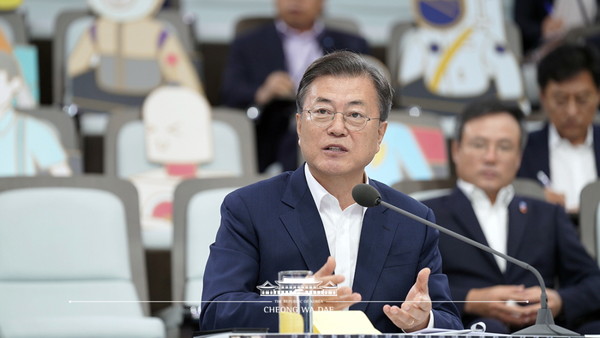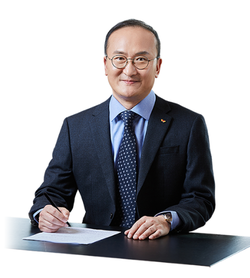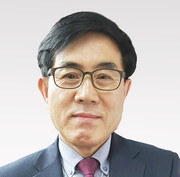Says President Moon especially cites SK Hynix
By Business Editor Kim Joo-ho
President Moon Jae-in said, “The government, businesses and researchers have joined forces, and the private and public sectors have worked together as one, making it possible for us to successfully overcome the crisis without a single setback in production to date.” President Moon made the remarks at a recent meeting with the business representatives in Seoul praising them on their successful overcoming of the effects of the trade dispute with Japan. Excerpts from the statement of President Moon follow:
Today, I’d like to brief the people on what we have achieved so far here at SK hynix. SK hynix was able to produce core semiconductors parts locally and emerge as an incubator for the next-generation semiconductor industry. I will also make a new public report on our Materials, Parts and Equipment Strategy 2.0.

Amid crises, we set a global example by successfully responding to COVID-19 without enforcing any “lock downs” – unlike other countries.
Just as Korea’s response to COVID-19 has become an international standard, our materials, parts and equipment industries can also lead the world in their respective areas.
The Materials, Parts and Equipment Strategy 2.0 to be unveiled today contains a policy shift; taking it a step beyond a passive response, we will leap forward from the foundation of what has been accomplished so far.

We will take a path different from that of Japan. The Republic of Korea will instead turn a crisis into an opportunity, working to emerge as a global powerhouse in state-of-the-art materials, parts and equipment. Along the way, we will continue to cooperate with the international community while contributing to the stabilization of global supply chains. This is Korea’s path that we intend to take.
I am deeply grateful to SK hynix, which made a bold decision to invest in mutually beneficial cooperation and other businesses that have strived over the past year for self-sufficiency in the production of materials, parts and equipment. My profound appreciation also goes to the people who have pooled their strengths to make this possible.
In less than a year, we succeeded in localizing the production of hydrogen fluoride gas and fluoride polyimide – for which we used to depend on imports from Japan. In addition, the volume of liquid hydrogen fluoride produced increased by more than twofold. The supply of EUV photoresist has also been stabilized after attracting investments from a global company.
The Government has also worked closely side by side. We’ve allocated over two trillion won in funding for a newly created special materials, parts and equipment account to intensively funnel investments into this sector. Approval and licensing periods have been greatly shortened, and supply chains once dependent on certain countries have been restructured.
A new model of mutually beneficial cooperation has taken root between the SMEs that supply materials, parts and equipment and the large businesses in need of them.
Various mutually beneficial agreements will be signed here today, including an agreement to revitalize reshoring by electronics businesses; an agreement to create a semiconductor cluster in Yongin; and a mutually beneficial agreement between foreign-invested companies and domestic materials, parts and equipment businesses. Most of all, it’s significant that we’ve gained confidence: By trying, we learned we could do it. This confidence has also been a big help in overcoming the COVID-19 crisis.
Recent border closures by many countries in response to COVID-19 and the spread of state-centered nationalism have caused growing cracks in the global division of labor.
In order for us to remain unswayed by the reconstructing of global supply chains and turn this into an opportunity instead, we have to take a leap on our own to become a global powerhouse of state-of-the-art materials, parts and equipment. At the same time, we must cooperate with the international community to stabilize global supply chains.
That goal is contained in the Materials, Parts and Equipment Strategy 2.0.
First, we will emerge as a global powerhouse of materials, parts and equipment industries.
We will dramatically increase the number of key items under our control. Currently, we have targeted 100 Japan-linked items. That number will increase to 338 linked to many other countries around the world. We will select 100 top domestic materials, parts and equipment businesses and foster them into global leaders.
We will swiftly respond to changes in the supply chain by establishing a digital supply network and smart logistics system. We’ll also curtail the costs and times associated with developing new materials by more than 70 percent through a “materials innovation AI platform.”
Second, we will make Korea the world’s factory for state-of-the-art industries by attracting such industries and promoting reshoring.
We will bring in cutting-edge industries by concentrating on new industries like semiconductors, bio-tech, future cars, hydrogen and secondary batteries. We will also promote reshoring with a focus on electronics, automobile, fashion and other highly important industries.
The Government will help domestic and foreign suppliers as well as the companies that need their products to gather and collaborate through the formation of state-of-the-art industrial clusters. We will introduce districts to attract investments in state-of-the-art sectors to existing industrial complexes.
Reshoring companies will receive tremendous support from the Government. We will create subsidies to assist with finding locations, facility investments and relocation costs, and we will amend laws to provide them regulatory support.
Third, we will strengthen cooperation with the international community to stabilize global supply chains.
We have keenly realized the importance of a trust-based international division of labor after experiencing Japan’s unjustifiable export control measures.
Paradoxically, the COVID-19 outbreak has proved that the world is already closely interconnected. Great value will be placed on a stable international division of labor and preserving free trade in the new world order of the post-COVID-19 era.

We have a strong manufacturing base and world-class ICT innovation infrastructure. Moreover, we have a business-friendly environment. Above all, Korea has proved to be the safest investment destination through the success of epidemic prevention and control measures against COVID-19.
Now, we have to move to make the Republic of Korea a global leader through the same spirit of solidarity and cooperation that we have demonstrated while responding to Japan’s export restrictions and surmounting the COVID-19 crisis.
Advancing our materials, parts and equipment and state-of-the-art industries equals overcoming the economic crisis and achieving industrial security and is a path to innovative growth.
All of you here are the main actors. We look forward to the economy of the Republic of Korea regaining vitality again from materials, parts and equipment industries. I wish for SK hynix’s continued progress.

